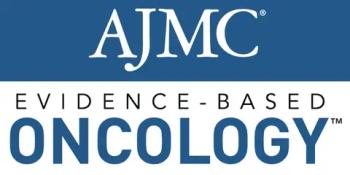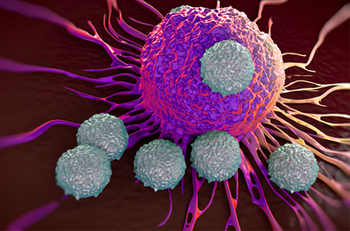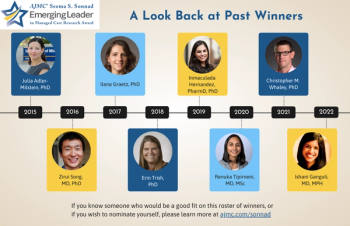
Two posters presented at the CHEST Annual Meeting 2023 showed how real-world exacerbation rates in asthma and chronic obstructive pulmonary disease (COPD) dropped after patients started using a single inhaler that delivers triple therapy.

Christina is the associate editorial director of The American Journal of Managed Care® (AJMC®) and Population Health, Equity & Outcomes, and joined AJMC in 2016. She oversees the publication of the print journals, from manuscript submission to publication, and works with the editors in chief and editorial boards to promote the journals.
She has a BS in public health from Rutgers University. You can connect with Christina on LinkedIn.

Two posters presented at the CHEST Annual Meeting 2023 showed how real-world exacerbation rates in asthma and chronic obstructive pulmonary disease (COPD) dropped after patients started using a single inhaler that delivers triple therapy.

With methamphetamines continuing to inflict damage on the Western United States, panelists at the CHEST Annual Meeting 2023 shared sobering statistics and important considerations in treating patients with pulmonary hypertension associated with use of this destructive drug.

Amid the impacts of climate change, industrial emissions, and environmental disasters, pulmonologists and other clinicians will need to deliver actionable advice on how to reduce the risks to lung health posed by air pollution, according to panelists at the CHEST Annual Meeting 2023.

Increasing lung cancer screening uptake without tailoring outreach and follow-up for underserved populations risks magnifying the existing racial and ethnic disparities in screening, so thoughtful approaches are needed to close the gaps, according to speakers at the CHEST Annual Meeting 2023.

New research explores the risk factors for lung disease in firefighters who were exposed to particulate matter when responding to the attacks on the World Trade Center (WTC) on September 11, 2001, as well as interventions that may mediate inflammatory responses.

As evidenced by a debate at the CHEST Annual Meeting 2023, the pulmonology community disagrees on whether the overlap of asthma and chronic obstructive pulmonary disease (COPD) is a distinct entity and how best to treat it.

The CHEST Annual Meeting 2023 will take place in Honolulu, Hawai‘i, from October 8-11, as pulmonologists and researchers from a multitude of specialties convene to discuss pressing topics, including the role of air pollution in lung health.

The 10 drugs, spanning disease states from diabetes to heart failure to rheumatoid arthritis, cost Medicare enrollees a total of $3.4 billion in out-of-pocket costs in 2022. As required by the Inflation Reduction Act (IRA), negotiations between Part D and pharmaceutical companies will take place this year and next, with the negotiated prices taking effect in 2026.

Full team coverage from the European Hematology Association 2023 Hybrid Congress, which took place June 8-11 in Frankfurt, Germany.

Panelists provided a wide-ranging view of the current avenues being investigated to optimize the treatment of chronic lymphocytic leukemia (CLL), including minimal residual disease assessment, combination regimens, and chimeric antigen receptor T-cell therapy.

The late-breaking oral session at the European Hematology Association (EHA) 2023 Congress featured newly emerged data from abstracts submitted after the deadline, including outcomes from trials in polycythemia vera, acute myeloid leukemia, and more.

Newly presented data reveal disparities between Black and White patients in both the characteristics of and the decision-making around treatment for chronic lymphocytic leukemia (CLL) and multiple myeloma, respectively.

With the number of treatment options in hematology and oncology rapidly expanding, so too are the strategies for determining and ensuring cost-effectiveness, according to session speakers at the European Hematology Association (EHA) 2023 Congress.

The first phase 3 results from the CARTITUDE-4 trial of ciltacabtagene autoleucel (cilta-cel) vs standard of care in lenalidomide-refractory multiple myeloma (MM) demonstrated the former’s convincing superiority in several key outcomes.

Results from the ASPEN and ALPINE trials of zanubrutinib showed greater improvements in quality of life (QOL) vs ibrutinib.

A friendly debate held at the European Hematology Association 2023 Congress focused on the potential for real-world data to improve the generalizability of clinical trial results but also acknowledged the limitations and current challenges with these data.

The use of immune therapies for hematological malignancies is expanding beyond chimeric antigen receptor (CAR) T-cell therapies in the traditional lymphoid disease states, but the impact on patient quality of life must remain top of mind, according to speakers at the European Hematology Association 2023 Congress.

The 2023 European Hematology Association (EHA) Congress, convening virtually and in Frankfurt, Germany, from June 8-11, 2023, will feature cutting-edge findings in oncology and hematology, with a special focus on incorporating patient-reported outcomes and real-world data.

At the 2023 Greater Philadelphia Business Coalition on Health annual conference, a panel of employers shared their advice on incorporating the principles of value into health benefits.

At the 2023 Greater Philadelphia Business Coalition on Health, panelists described the ways their organizations are promoting access to primary care in hopes that it can be part of the progress toward achieving the Quadruple Aim of lower costs, better outcomes, patient satisfaction, and clinician experience.

Kicking off the 2023 Greater Philadelphia Business Coalition on Health annual conference, Mark Fendrick, MD, of the University of Michigan, delivered a keynote exhorting the audience of employers and payers to implement the principles of value-based insurance design (VBID) in order to improve individual and population health and drive toward equity.

After winning our Seema S. Sonnad Emerging Leader in Managed Care Research Award, these researchers have gone on to make substantial impacts in the field of managed care and mentor the next generation of investigators.

A panel assembled at the American Academy of Dermatology 2023 Annual Meeting encouraged the audience of dermatologists to advocate together for needed changes in payment, access, and practice.

Posters presented at the American Academy of Dermatology 2023 Annual Meeting provided a snapshot of disparities in dermatology care, both in terms of geographic differences in access to care and collection of race/ethnicity data in clinical trials.

A pair of posters presented at the American Academy of Dermatology 2023 Annual Meeting showed the efficacy of ruxolitinib cream in improving symptoms of vitiligo on the face, both as assessed by investigators and by how noticeable the patients felt their vitiligo was.

Once thought of as the result of an imbalance in bodily humors, inflammatory skin diseases are now understood to arise from types of immune responses, opening the door to targeted therapies and personalized medicine, according to speakers at the American Academy of Dermatology 2023 Annual Meeting.

Amid a packed roster of of late-breaking research at the American Academy of Dermatology 2023 Annual Meeting, investigators presented findings from long-term extensions of the Topical Ruxolitinib Evaluation in Vitiligo phase 3 studies.

Speakers at the American Academy of Dermatology 2023 Annual Meeting highlighted the potential of DataDerm to tell the story of dermatological care in the United States, but some also cautioned that the registry only reflects those who have access to care in the first place.

A symposium at the American Academy of Dermatology 2023 Annual Meeting convened speakers who presented current data on the use of Janus kinase (JAK) inhibitors in dermatology, including in atopic dermatitis and vitiligo.

The 2023 American Academy of Dermatology Annual Meeting, held in New Orleans, Louisiana, from March 17-21, 2023, will feature research and presentations exploring the mechanisms, presentation, and treatment of dermatological disorders.

259 Prospect Plains Rd, Bldg H
Cranbury, NJ 08512
© 2025 MJH Life Sciences®
All rights reserved.
